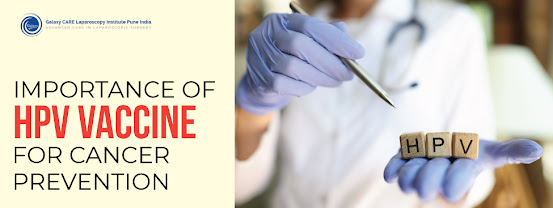IMPORTANCE OF HPV VACCINE FOR CANCER PREVENTION
In the realm of healthcare, prevention often takes precedence over treatment. When it comes to combating cancer, prevention strategies play a pivotal role in reducing its burden on individuals and healthcare systems alike. One such preventive measure that stands out is the HPV vaccine. Human papillomavirus (HPV) is a common sexually transmitted infection that can lead to various cancers, making the HPV vaccine a crucial tool in cancer prevention efforts. In this blog, we delve into the significance of the HPV vaccine in preventing cancer and why its widespread adoption is paramount.
Understanding HPV and its Link to Cancer:
Human papillomavirus (HPV) is a group of viruses transmitted through sexual contact. While many HPV infections resolve on their own without causing any symptoms or health issues, certain strains of the virus can lead to the development of cancers. HPV is primarily associated with cervical cancer, but it can also cause cancers of the vulva, vagina, penis, anus, and oropharynx (the back of the throat, including the base of the tongue and tonsils).
The Role of the HPV Vaccine:
The HPV vaccine works by triggering an immune response that protects against the most common cancer-causing strains of the virus. By preventing HPV infection, the vaccine effectively reduces the risk of developing associated cancers. It is most effective when administered before exposure to the virus, which is why vaccination is recommended for adolescents before they become sexually active. However, the vaccine can still offer benefits to older individuals who may not have been vaccinated earlier.
Key Benefits of HPV Vaccination:
- Prevention of Cervical Cancer: Cervical cancer is the fourth most common cancer in women worldwide, and HPV infection is a major risk factor for its development. HPV vaccination has been shown to significantly reduce the incidence of cervical pre-cancers and cancers by targeting the strains responsible for the majority of cases.
- Protection Against Other Cancers: In addition to cervical cancer, the HPV vaccine offers protection against other HPV-related cancers, including anal, vaginal, vulvar, penile, and oropharyngeal cancers. By reducing the prevalence of HPV infection, vaccination helps mitigate the risk of these malignancies.
- Herd Immunity: HPV vaccination not only benefits individuals who receive the vaccine but also confers indirect protection to unvaccinated individuals through herd immunity. As more people are vaccinated against HPV, the overall prevalence of the virus in the population decreases, reducing the risk of exposure for everyone.
- Long-lasting Protection: Studies have shown that the HPV vaccine provides long-lasting protection against HPV infection and associated cancers. This sustained immunity underscores the importance of vaccination as a durable preventive measure.
Challenges and Barriers to HPV Vaccination:
Despite its proven efficacy and benefits, HPV vaccination rates remain suboptimal in many parts of the world. Several factors contribute to this, including lack of awareness about the vaccine, misinformation or misconceptions, concerns about safety and side effects, and limited access to healthcare services. Addressing these challenges requires concerted efforts from healthcare providers, policymakers, educators, and communities to promote HPV vaccination as a fundamental component of preventive healthcare.
Conclusion:
The HPV vaccine represents a groundbreaking advancement in cancer prevention, offering protection against HPV-related malignancies that claim thousands of lives each year. By immunizing individuals before they are exposed to the virus, the vaccine holds the promise of reducing the incidence of cervical cancer and other HPV-associated cancers on a global scale. Embracing and promoting HPV vaccination as a public health priority can help save lives, alleviate the burden of disease, and move us closer to a future where preventable cancers are rare occurrences. Let us harness the shield of the HPV vaccine and empower individuals to safeguard their health and well-being against this formidable adversary.



Comments
Post a Comment